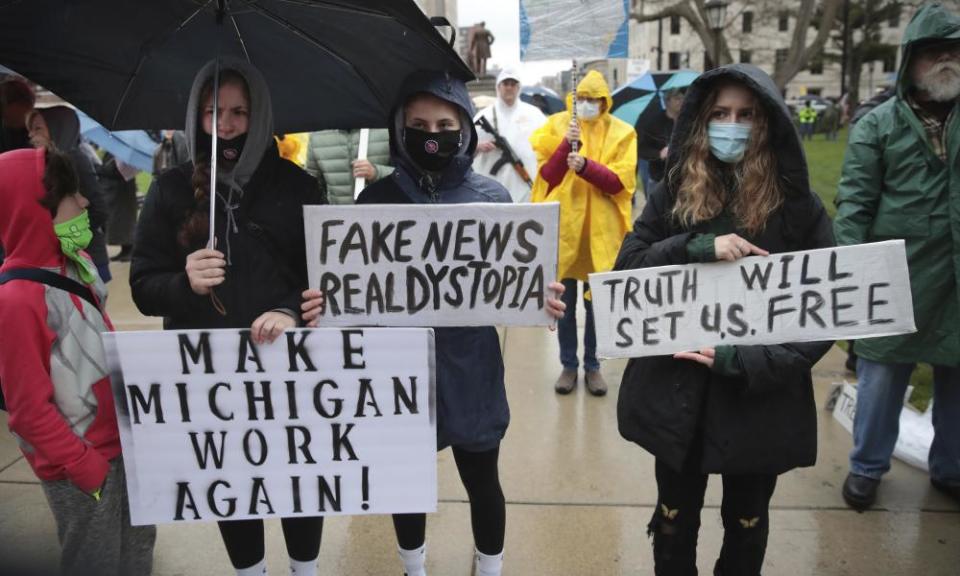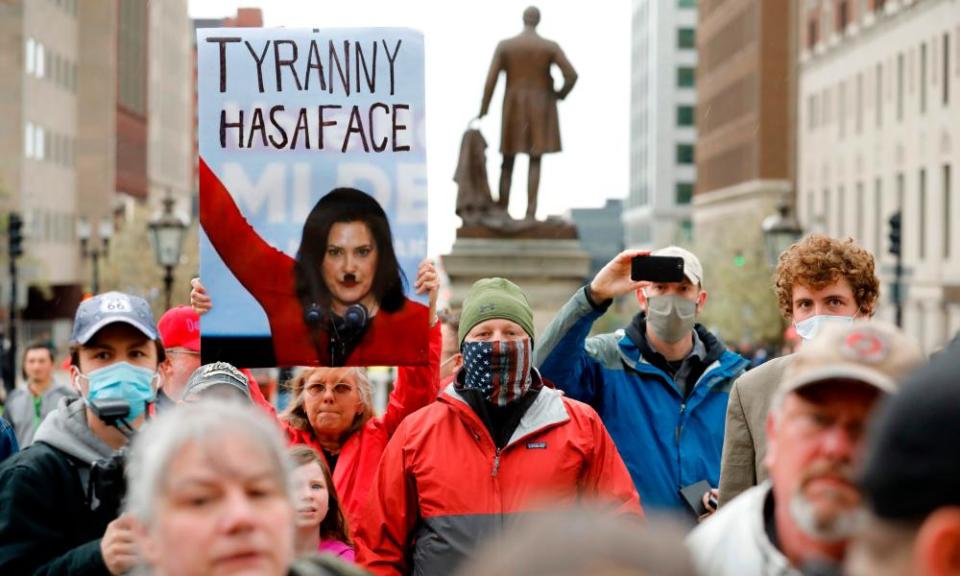Protesters descend on Michigan capitol but rain washes away demonstration
Following a week of escalating tensions over threats of violence made against Michigan’s Democratic politicians and an ongoing, emotional debate over Gretchen Whitmer’s stay-at-home order, dozens of conservative protesters descended on the state capitol on Thursday morning.
Some arrived armed with assault rifles while others held up signs portraying the governor with a Hitler moustache and one speaker taunted police and called for Whitmer to be pulled outside and arrested for breaking the law with her emergency orders.
Related: 'Big Gretch': how the pandemic pushed Michigan's governor into the spotlight
But the fears of serious violence that had preceded the event proved unfounded. Instead, a steady downpour and lightning pushed most of the protesters to their vehicles after about 90 minutes. Tempers only briefly flared when a scuffle ensued after one demonstrator grabbed a sign from another. Police quickly broke up the fight and no one was arrested or hurt, the Michigan state police said in a tweet.
The state senate and house also cancelled their Thursday morning sessions.
Adam de Angeli, an organizer with militia-linked Michigan United For Liberty, told the crowd: “We are not going to be intimidated and we are not going to be silent,” he said. “This is the biggest infringement on our rights in our history. This is devastating to our country and economy.”

Many of the demonstrators also questioned the constitutionality of the governor’s orders.
“What’s worse – having a cough or having a tyrannical leader who takes your freedoms away?” asked Tom, who told the Guardian he belonged to a Michigan militia but declined to give his full name. He held an assault rifle as he stood on the capitol lawn in full camouflage.
Michigan in recent weeks has become a flashpoint in the debate over stay-at-home orders, but in no other state has there been a serious threat of violence. The state has recorded the seventh highest number of Covid-19 cases, according to Centers for Disease Control and Prevention data, and Wayne county, which holds the city of Detroit, has seen some of the US’s highest rates of infection.
Whitmer has instituted strict emergency orders in an attempt to control the virus’s spread, and while that has led to protests that received national attention, recent polling shows bipartisan support for her management of the crisis.
Still, tensions ratcheted up on 30 April when armed militia members glared and shouted at lawmakers from the Senate gallery during an emotional debate over extending Whitmer’s stay-at-home order through the end of May. Democrats charged that the protests were intimidating lawmakers.

Organizers had billed Thursday’s protest as “Judgment Day”. State police and the attorney general, Dana Nessel, responded with warnings that those who brandish weapons, obstruct police or did not follow social distancing guidelines would be ticketed or arrested.
But the protest was largely calm. Some demonstrators wore masks, but few followed social distancing guidelines. Police mostly stayed inside the capitol building or in small groups along the capitol grounds’ perimeter.
Phil Robinson, a member of the Michigan Liberty Militia, carried an assault rifle and wore full armor. He told reporters that the idea that militia members were there to intimidate was wrong and characterized his group as peacekeepers and “law-abiding citizens”.
Whitmer’s stay-at-home orders have so far survived legal challenges in federal court. But the Republican-controlled legislature filed a suit that the Michigan supreme court will soon hear. Though conservatives hold a 4-3 majority on the court, it frequently does not rule along party lines.
Meanwhile, the Republican congressman Paul Mitchell and well-funded conservative groups have launched a citizen-initiated ballot drive that would exploit a loophole in Michigan’s constitution to allow the GOP-controlled legislature to repeal the 1945 state law that gives governors their emergency powers.

